The news of Tom Moran’s death just after midnight on Sunday, August 12, 2018 hit hard. He is a great loss to the Irish, and the larger community, where he was a giant supporter of everything – from arts and education, and peace in Northern Ireland – to bringing relief to troubled spots around the globe.
Tom, who was 65, had a long, successful career at Mutual of America, which he joined in 1975. He became CEO in 1995, taking over from Bill Flynn (another powerhouse of the Irish American community, who died earlier this year), and served in that role until retiring in 2016. He retired as Chairman of the board in March this year.
While he enjoyed much corporate success – under his watch, Mutual grew into a retirement savings company with over $20 billion in assets – it’s for his humanitarian work that Tom Moran will likely be remembered. He did a tremendous amount of work behind the scenes on the Irish peace process and in growing the outreach of Irish relief organization Concern Worldwide, but he was never one to take credit as he said in a reluctant interview I did with him in 2008, “It’s less that I would prefer to be behind the scenes and more that there are other people who are deserving of the attention. Whether it’s Concern – when you get exposed to the people of Concern you realize how insignificant your role actually is – or the peace process in Northern Ireland where my role was as a cheerleader for those that were interested in doing the right thing. The reality is that it’s the people whose lives are on the line that deserves the credit for things that have gotten done.”
He served as chairman of the board of Concern from 2001 to 2017, raising awareness and millions of dollars to help the poorest of the poor around the world, from remote villages in Ethiopia to refugee camps in Lebanon to urban slums in Haiti.
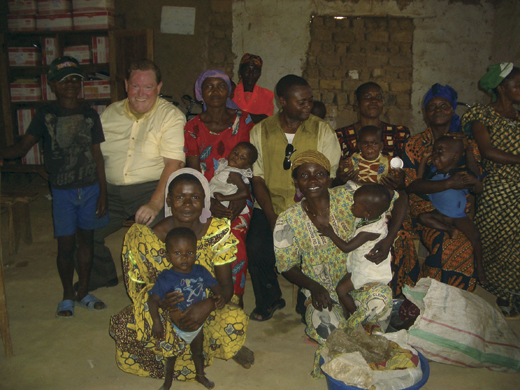
And he didn’t just give money, and raise money, Tom took Concern’s mission personally and made hundreds of visits to troubled spots around the world, bringing relief and a smile to everyone he met.
Tom was a great supporter of Irish America magazine and we extend condolences to his wife, Joan, his extended family, and his many colleagues and friends at Mutual of America and Concern Worldwide.
There is a saying that as long as one person speaks your name you will not be forgotten. Tom touched so many lives in his short time here on earth that he will live on in our hearts and minds for many years to come.
And now, here’s Tom in his own words from that 2008 interview.
Tell me about your early mentors.
Actually, it goes back to grammar school and not being able to speak until the first or second grade. The good nuns of the Daughters of Divine Charity on Staten Island worked with me and got me to speak, and put up with me the years that I couldn’t. I owe them a great deal, they were terrific, and I still support them when I can.
Then at 14, I began my working career with a job as a janitor at my high school. Many of the lessons I learned from the full-time janitors, Arty, Frank, and Dominic, are still with me. All of them were ancient, I thought. I realize now that they probably hadn’t reached 50 years of age. But what I learned from each of them is that every job is deserving of respect. Dominic and I used to take turns mowing the football field, and at 14, I had a great deal of energy, yet I could never get the field mowed in the time that Dominic did, and he always looked like he was going so slow. But it was the fact that he understood the rhythm of the job and had respect for the job, that I still had to learn. I believe, to this day, that every job has a certain rhythm to it, and that every job is deserving of respect.
Following my janitorial experience, I worked as the French fries man at Nathan’s, a short-order cook at a dental factory, and as a cemetery worker. All of these experiences reinforced what I had already learned at the age of 14.
At Nathan’s, I worked alongside Benny the hot dog man. In addition to being the very best at his trade, Benny knew how to make his job fun, singing out “A pound of bread, a pound of meat, and all the mustard you can eat.” The sense of pride and joy he had in his job made all of us enjoy our own jobs that much more.
Didn’t you also drive a cab?
It might have been while driving a taxi at two o’clock in the morning during my college years that I developed my passionate belief in the greatness of our country and the power of the American Dream. I came to understand how hard people are willing to work under what, at times, can be extreme conditions, just because of the promise of a better life for their kids.
Everyone I met at the garage while waiting for my cab to come in from the day shift, was hoping for something more from life, either for themselves or their children. And, it is only in the United States of America that those dreams can be realized.
When did you join Mutual?
I started at Mutual of America in 1975. I had a very important position at the time [smiles]. Whenever a pension was sold, I’d paperclip anything that needed to be signed. My boss at the time was Juana Luna, and she’s still a dear friend of mine, still working at Mutual today. She always made me feel as if I was important to the company. And when there was a pile of contracts that had been paperclipped, I was sent to have them signed, by then-president Bill Flynn. What was remarkable, and again another great lesson for me was that Bill always took the time to ask me how I thought the company was doing. It made me feel as if I was important to the company and that he genuinely cared about what I had to say. In fact, he was probably using the time to sign the contracts, but he always had a way about him that each of us understood how important we were to the company. We also understood that if there was ever a time that we were in need, Bill would be there for us.
At the Concern dinner, Elie Wiesel said that while he has come across “humanity” in individuals, the first time he came across it in an entire organization was when he encountered Mutual of America.
Mutual of America is the only corporate board that Elie serves on. He sees us as a unique organization that genuinely cares about making a difference, and that there is, very much, a soul to Mutual of America. In my opinion, that soul was first created by the organizers of the company and nurtured and developed by Bill Flynn in his years there. Hopefully now with my time, I also care deeply about the same issues, which are all involved with making the world a better place. And each and every one of our employees share in that commitment. One hundred percent of our employees participate in some kind of philanthropy, either through volunteering their time or making donations. We are a company that is as proud of what we do outside of the industry as we are of what we accomplish in the industry.
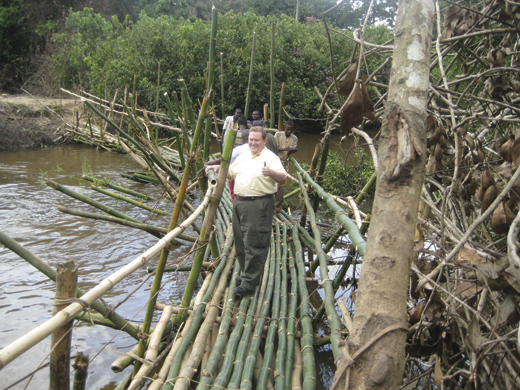
I once heard you say something like “Real strength does not come from how tall you stand or if you can stand at all.”
I’ve been a long supporter – since 1992 – of the National Center for Disability Services, now known as ABILITIES, and the Henry Viscardi School, which is a combined pre-school, grammar school, and high school for young people who have physical disabilities. Much like the disabled people I have met in other parts of the world, these are people who show great strength and dignity. I think our society has still not fully accepted the contribution that can be made by disabled persons, and the Viscardi school does a wonderful job of developing teaching techniques that will ultimately be put into the mainstream schools, and will benefit all of our society, not simply disabled children. These children are going to make great contributions, and have made great contributions, and will continue to do so if given the chance.
I also know that Mutual of America is a sponsor of public television.
We’re very influenced by our traditional client base, which is the not-for-profit sector, and that client base also cares about making a difference in the world. Public Broadcasting is the one opportunity where a voice is given to the really significant issues facing our country and our society, and it’s for that reason that Mutual of America has aligned itself with Public Broadcasting. Bill Moyers, we are his sole corporate underwriter and have been for more than a decade, and the relationship is one that we take a great deal of pride in. Not because we agree with everything Bill may say on a particular show at a particular time, but because we know that when he expresses an opinion it is thought-provoking and encourages people to engage in a deeper discussion of that important issue. Similarly, we are the corporate underwriter for Religion and Ethics News Weekly, The Open Mind, and Wide Angle; each of them in their own way promotes the idea that important issues deserve good and thorough discussion. We don’t all have to agree on every issue, but if we can engage in discussion of the issues we will be a better society for it.
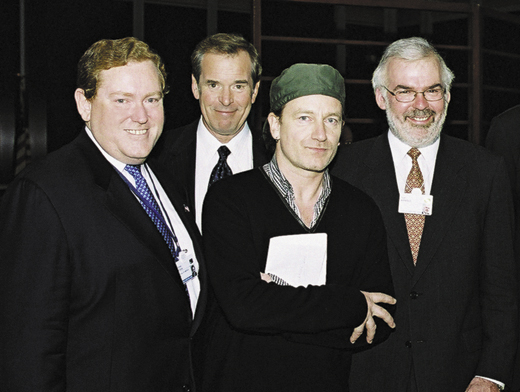
This kind of “open discussion” philosophy is what you and Bill Flynn put into place when you became involved in the North of Ireland peace effort, and invited the leaders of different parties to speak in New York at the Mutual of America building.
For me, one of the great privileges of working at Mutual of America was to get to know and become friends and work with Bill Flynn. And what is incredible about Bill is that anything that excites him, he shares. And I was lucky enough that he shared Northern Ireland with me. As a result of that, I developed great friendships across all divides in the North of Ireland, and those friendships hopefully led to my playing a supportive role with Bill in the goodwill that was needed to bring peace to the people in the North. But the peace process is, in my opinion, still in a very early stage, and it is now very much going to depend on the development of a viable economy. Children today grow up without the same reality of violence their parents had, but they still don’t have the reality of opportunity that’s needed for them to have a great future. And they deserve to have that, they’re great people on all sides.
So when did you first visit Ireland?
I first visited in 1970. I met a couple of guys at Doherty’s Bar and Grill on Staten Island and they invited me over. I had a great time. It was an exciting time with good friends, but the truth of it is my real passion for Ireland came after being able to go there with Bill Flynn and Bill Barry and seeing the great relationships they had already developed.
Your wife Joan also has Irish roots. Where did you two meet?
After working at Mutual for a year, I managed to get a two-month leave of absence and traveled around Europe. When I got back, I was told about a pretty Irish-American girl who worked on the other side of the office. It was 1976 and that girl was Joan. After dating for several years, I finally convinced her to marry me in 1983. She still works at the company and, today is in charge of all of our technology. She’s my best friend and partner. We just celebrated our 25th wedding anniversary. When we first got married there was a question about our both working at Mutual. Bill Flynn finally agreed to it because, as he says, he wasn’t sure I’d be able to find another job.
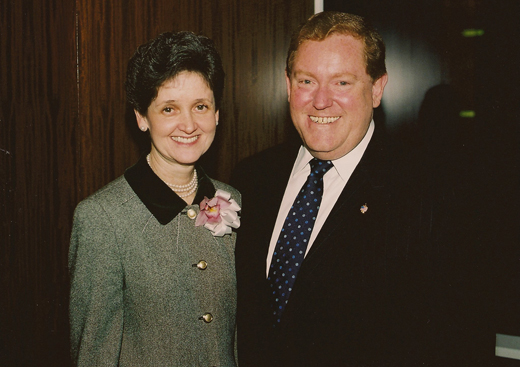
How did you become involved with Concern Worldwide?
It’s a long story involving a late night with Father Aengus Finucane [co-founder] and Siobhan Walsh [U.S. Executive Director]. They invited me to get involved and from that point, I first became a donor and then I became more informed and more passionate about the work Concern was doing in the poorest countries in the world. I was then asked to go on the board. Initially, I said I didn’t have the time, but I was convinced by John Scanlon [then chairman of the U.S. board], and as soon as I said I would, he had a massive heart attack and died. I then became Concern’s chairman of the board. It was pretty much by default, but it was the best thing that has happened to me. I’ve had the opportunity to travel to Ethiopia, Sri Lanka, Haiti, Rwanda, and the Congo. And each trip I’ve learned something new about the work of Concern and each trip I’ve been more impressed. With each trip, my belief is confirmed that every parent wants a better life for their child as their primary reason for existence.
From these trips and seeing such extreme poverty, do you come away with any sense of hope or are you just completely devastated by it?
I visited Niger, which is the poorest country in the world, and I saw people who are full of life and excitement, and dignity and deserving of respect, and optimism. And when you meet people like that, how can you be anything less than optimistic for them? And I’ve learned that in some of the poorest countries of the world there is incredible generosity, they will share whatever they have, and they share their spirit with you, and it’s such a powerful spirit they have. And I often think of the Irish surviving the Hunger and the powerful spirit they had. You see the same thing in Africa today. An incredible group of people, and instead of coming away depressed and despondent you come away filled with hope for the world, because this is the future of the world, and I have every confidence in their ability to overcome the adversities that they face.
The New York dinner (Dec. 5) was a record fundraiser for Concern.
This was the first year that we hit the threshold of one million dollars raised and it is because of all the people who genuinely care about Concern, and because of all of the staff under the leadership of Siobhan Walsh, and it’s because of the passion that Ed Kenney [Executive Vice President of External Affairs for Mutual of America] has for Concern and the work that he did to make sure that that room was filled beyond capacity. It was an exciting dinner. It was right that it should be the threshold dinner because we had as our honoree Elie Wiesel, who spoke about what it means to have “concern.” He spoke with the experience of a Holocaust survivor, but I think, most importantly, he spoke with the faith of a man who knows that hope is possible even in the worst of cases.
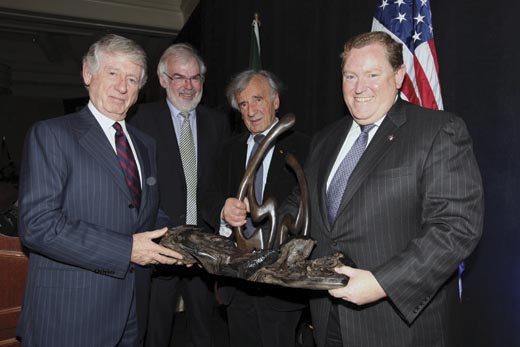
Picture; Liam Burke/Press 22
You and Elie Wiesel share something, in that neither of you likes to be the center of attention, and he actually mentioned on that night that the only reason he was there was out of respect for you.
So now I should be punished for this! [Laughs].
I know that you very much prefer to stay behind the scenes.
It’s less that I would prefer to be behind the scenes and more that there are other people who are deserving of the attention. Whether it’s Concern – when you get exposed to the people of Concern you realize how insignificant your role actually is – or the peace process in Northern Ireland where my role was as a cheerleader for those that were interested in doing the right thing. The reality is that it’s the people whose lives are on the line that deserves the credit for things that have gotten done. It’s the courage and vision of Gerry Adams. It’s the wisdom of Rev. Ian Paisley, who after so many years realized that this was the place for him to be. It is all the people, David Ervine [Progressive Unionist Party leader] who always spoke so eloquently about the need for a better solution, and challenged not just Nationalists but Unionists and his own Loyalists to stretch themselves to see his vision of what the future could and should be.
I know that you had a great deal of respect for David Ervine.
One of the great losses, in my opinion, was the untimely death of David Ervine [Jan. 2007]. He died way too young, in his early fifties. He played such a great role. At his funeral there were 600 people in the church, 300 gathered downstairs where the pastor had set up speakers, and another 3,000 lining the streets outside. And when you looked out at the church filled with friend and foe alike, you couldn’t help but be moved by the great influence that David had exercised as the leader of one of the smallest political parties on the island, but his voice was one of the loudest heard. His brother commented at the funeral that in death David had achieved what he strived for in life. And that was a reference to the fact that Gerry Adams was seated alongside representatives of the Ulster Unionist Party and the Progressive Unionist Party, and it was the first time that Gerry had been in this part of Belfast and certainly the first time he had been at the church. It was an incredible experience. I consider one of the great riches of my life was having David as a friend. Today a foundation has been set up – the David Ervine Foundation – to promote education in East Belfast in the Loyalist areas so that young people will have opportunities other than violence to advance themselves.
You have also been involved on the education front in Ireland.
I had the privilege of chairing the Smurfit School of Business at University College, Dublin (UCD). It gave me a chance to meet an incredible group of people who, in my opinion, were responsible for the roar of the Celtic Tiger.
And just as education played such an indelible role in the development of the Irish economy, it will play the same role for the North of Ireland. And Queens University was just made a part of the Russell Group, which is the equivalent of an Ivy League school, a ranking largely attributed to the great reputation and the great quality provided, and the research that is done there. I’m convinced that Queens University will play a major part in the economic development of the North.
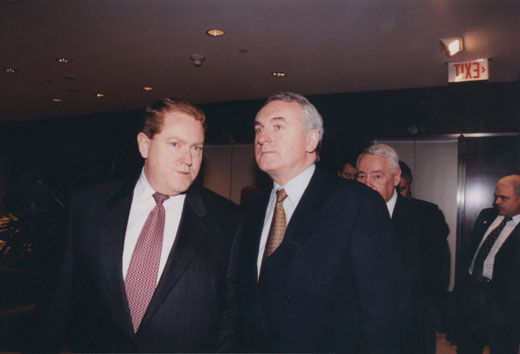
Can you tell me a little bit about your Irish ancestors?
I am of both Irish and Italian descent. On my father’s side my great-great-grandparents were married in Carrick-on-Suir, County Tipperary, there’s not much record beyond the marriage. And according to my grandfather’s notes his grandfather left Ireland because he was on the run from the constabulary and ended up in Hume, England where my great-grandfather was born, and a year after that he came to the States. On my mother’s side, my Italian grandfather came from just outside Salerno, Italy. His name was Arturo Quaranta, and he married Peggy O’Neill, whose family came from Kesh, County Fermanagh.
Did you learn a love of politics from your father?
My father is an absolute Democrat and is right now suffering with Lou Gehrig’s Disease, but he will argue politics with the best of them. I fully expect before this presidential election is over I will see him on Meet the Press. He’s quite an amazing man.
How do you see America’s role in the world?
As you travel around the world you realize what an incredible influence the United States has and the potential that we have to do great good in the most difficult of situations. The peace process in Northern Ireland was greatly supported by the government of the United States, which believed that peace was possible and made it clear that it would be supportive of any efforts for peace. In Sri Lanka, we heard stories about the U.S. military that came immediately following the tsunami to rebuild schools. In Africa, in the poorest countries, what a great sense of pride it is to see the Concern workers taking the bags marked U.S. AID, and to know that the U.S. has supported efforts to keep children alive and to provide for a better existence and a better life. It’s awfully easy sometimes to see the negative sides of our world, but I think that those who have traveled and understood and heard from the people who suffer the most recognize how powerful our country is for the good.
Thank you, Tom. ♦
Read tributes for Tom Moran from members of the Irish community.

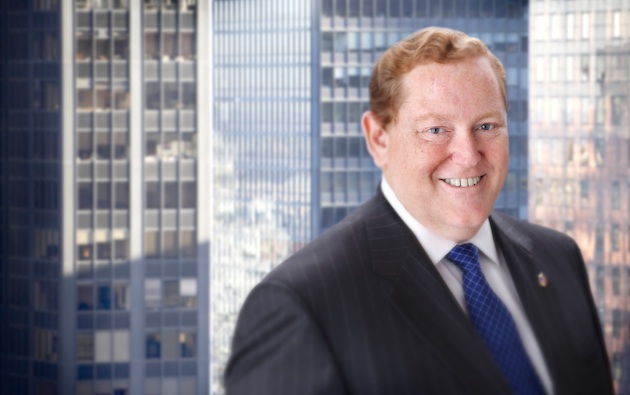
Tom was am amazing man and a great friend of Ireland. He was so giving of his time. He was incredibly supportive of my childhood friend, the late Professor Paddy Johnston, President of Queens University. Tom, you will be missed and thank you, we had some great evenings together.
Peter
I’m very much saddened to hear we have lost Tom.
I met him in 2004 at the Wall Street 50 event and we became fast friends.
I greatly enjoyed getting together with him on St.Patrick’s Day in NYC, The Cardinal’s mass, Langans. the parade itself and then finishing up in Hell’s Kitchen at Gallagher’s. We made sure we always spoke to each other on those St.Patrick’s Day’s I was unable to get up from Texas for the big day and I will surely miss my friend. He was just a great guy and I’m sad he’s gone.
Great article Patricia and thanks to you and Niall for making it possible for this Irish Texan to meet my great friend Tom Moran